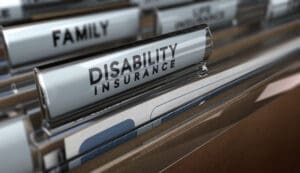Do You Have the Correct Disability Insurance?

Business Overhead Expense (BOE) Disability Insurance
Business overhead expense (BOE) disability insurance, also known as Business Expense Insurance, pays the insured’s business overhead expenses if the business owner(s) becomes disabled. A BOE policy pays a monthly benefit based on actual expenses, not anticipated profits. It is designed for businesses that rely on a small number of people (or one person) to produce revenue.
Coverage: The following business overhead expenses are typically covered by a BOE disability policy:
Rent, Interest payments on some business debts, Utilities, Employees’ salaries and payroll taxes, Postage and stationery, Equipment maintenance, Rental, lease, or depreciation of office equipment, Taxes on the business property location, Insurance premiums for Workers’ Compensation, employee medical and liability, Accounting fees, Professional memberships and subscriptions.
Policies do not typically cover the salary of a temporary employee hired to do the duties of the disabled unless a substitute salary expense or similar rider is purchased with the policy. Income taxes and the cost of inventory are some expenses that are not Covered.
Characteristics
Benefit Periods: BOE insurance policies have short benefit periods that do not usually exceed two years. Elimination Periods: BOE policies typically have short elimination periods; either 30, 60 or 90 days. This is the amount of time from the claim, or date of loss, until the benefits begin.
Maximum Benefits: BOE insurance policies offer a maximum monthly benefit, but only reimburses the policy holder for actual overhead expenses incurred if they are less than or equal to the maximum benefit. With some insurers, any unused benefit can be applied to increase future monthly maximums or to extend the benefit period.
Taxation: BOE insurance benefits are reportable as income and the premiums are tax deductible as a business expense.
Rates: BOE insurance rates are based on the insured’s age (at time of purchase), occupational duties, health status, optional riders selected, benefit period, and elimination period. Once a BOE policy is owned, coverage can not be increased without providing evidence of medical insurability, unless a future increase option or similar rider is purchased at time of policy issue.
Own-Occupation vs. Any-Occupation Disability Insurance
When purchasing private BOE disability insurance, you’ll find both own-occupation and any- occupation coverage options.
Own-occupation is a more robust disability insurance product. It insures you against an inability to complete the specific job you have. Typically, it’s more expensive than any-occupation disability insurance.
Any-occupation disability insurance, by way of contrast, insures you only if you’re unable to work any job you’re reasonably qualified for, even if it’s at a lower pay rate.
Let’s dive deeper into the differences between these two products.
Own-Occupation Disability Insurance
Own-occupation disability insurance, as its name suggests, covers any disability that keeps you from performing your own current occupation. In many cases, you’re still eligible to receive benefits even if you find another job.
There may be language in the contract stating that you have to have been working at the moment you became disabled. But there are also policies available that cover people who become disabled outside work if their disabilities still prevent them from performing their job duties.
Highly skilled surgeons, for example, frequently get own-occupation insurance, since their jobs require such finely-tuned motor skills. For instance, if Grey’s Anatomy heart surgeon extraordinaire Dr. Preston Burke, who suffered from hand tremors after surviving a gunshot injury, had had own-occupation insurance coverage, he could have chosen to move into a different role in the hospital and still received benefits for losing his ability to perform his original job. He could also have chosen not to work at all and still have received benefits.
Any-Occupation Disability Insurance
Any-occupation disability insurance changes the occupational disability definition. Instead of providing coverage if you’re unable to perform your job, this kind of insurance provides coverage only if you’re unable to perform any job you’re reasonably qualified for.
Any-occupation insurance is a much less flexible and reliable form of disability insurance coverage.
“Reasonably qualified” is determined by the insurance company, based on your age, education, and experience level. And if you’re still considered “capable” of working with the disability— even if it’s at a lower-paying job—you would likely not receive any disability benefits at all.
This means that any-occupation insurance is a much less flexible and reliable form of disability insurance coverage. However, it’s often the only option available through an employer. Read your benefits package carefully, since you might want to purchase additional coverage to ensure that you’ll receive benefits if you do find yourself unable to do your work.
Let’s go back to the Dr. Burke example to see how the difference between these two insurance coverage options play out. Because Dr. Burke was still a talented doctor who could perform other medical services and assessments, any-occupation disability insurance wouldn’t have covered him at all after he sustained his gunshot wound. Although he was unable to perform delicate heart surgeries, he could have taken another job in the hospital or even a job outside the medical field entirely. Thus, his any-occupation disability insurance wouldn’t have kicked in unless he sustained a more incapacitating injury, rendering him unable to work at all.
The Takeaway
Disability insurance helps you replace part of your lost income if you become unable to perform your job duties due to an illness or injury. But how you’re covered depends in large part on whether you have own-occupation or any-occupation insurance. Own-occupation disability insurance coverage kicks in if your disability prevents you from performing the specific occupation you hold.
Any-occupation disability insurance coverage kicks in only if you’re found to be unable to perform any job you’re reasonably qualified for. That’s why it’s key to know what kind of insurance you have.
Feel you need to discuss your disability insurance options confidentially with an expert? Contact us now and we will help you. Call us Toll Free at 877-PLIG-123 (1-877-, or email us at info@ProtectUsBetter.com.

